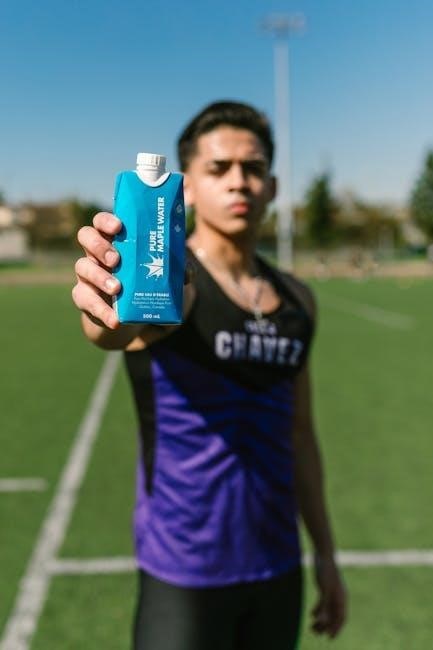A well-structured marathon nutrition plan is essential for optimal performance, recovery, and stamina․ Proper fueling with carbs, hydration, and electrolytes ensures sustained energy levels and prevents fatigue during training and racing․
1․1 Importance of Nutrition in Marathon Training
Proper nutrition is the cornerstone of successful marathon training, directly impacting energy levels, recovery, and overall performance․ A well-planned diet ensures that runners can meet the high demands of training while avoiding fatigue, injuries, and digestive issues․ Nutrition plays a critical role in fueling workouts, repairing muscles, and maintaining hydration levels․ Without adequate nourishment, runners risk underperformance, prolonged recovery times, and increased susceptibility to illness or injury․ A balanced intake of carbohydrates, proteins, and fats, along with electrolytes and fluids, is essential for sustaining endurance and supporting the body’s needs throughout the training journey․ Nutrition strategies must be personalized and practiced during training to ensure they work effectively on race day․

Core Components of a Marathon Diet
A marathon diet focuses on carbohydrates for energy, protein for muscle repair, fats for health, hydration, and electrolytes to maintain fluid balance and support performance․
Carbohydrates are the cornerstone of a marathon diet, providing the primary energy source for runners․ They are stored in the muscles as glycogen, which fuels endurance during long runs․ Complex carbs like whole grains, fruits, and vegetables are ideal for sustained energy, while simple carbs, such as bananas or energy gels, are best for quick energy during races․ Carb-loading is essential in the final days before the marathon to maximize glycogen stores, ensuring runners can maintain their pace and avoid hitting the wall․ Proper timing and intake of carbs are crucial to optimize performance and prevent digestive discomfort․ Protein is vital for muscle repair and recovery, especially during intense marathon training․ Runners require 50-75% more protein than non-runners to rebuild and strengthen muscle tissues damaged during runs․ Lean sources like chicken, fish, eggs, and plant-based options such as beans and tofu are ideal․ Aim to consume 1․2-1․6 grams of protein per kilogram of body weight daily, spread across meals․ Timing matters—take protein within 30-60 minutes post-workout to aid recovery and before bed to support overnight muscle synthesis․ Adequate protein intake ensures faster recovery, reduces injury risk, and maintains overall muscle health, allowing runners to perform at their best during training and on race day․ Fats are a crucial component of a marathon diet, providing essential energy, supporting brain function, and aiding in the absorption of vital nutrients․ Healthy fats, such as avocados, nuts, seeds, and olive oil, are rich in calories and help sustain endurance during long runs․ They also play a key role in reducing inflammation and enhancing recovery․ While fats should not dominate the diet, they should be included in moderation to maintain overall health and energy balance․ Balancing fat intake with carbohydrates and proteins ensures a well-rounded nutrition plan tailored to the demands of marathon training․ Proper fat consumption supports long-term energy needs and overall bodily functions․ Hydration and electrolyte balance are vital for marathon performance, as they regulate bodily functions and prevent dehydration; Water and sports drinks help replenish lost fluids, while electrolytes like sodium and potassium maintain nerve and muscle function․ Proper hydration strategies include drinking water regularly, adjusting intake based on sweat rates, and consuming electrolytes during long runs․ Monitoring urine color can help ensure adequate hydration, with pale yellow indicating proper levels․ Neglecting hydration can lead to fatigue, dizziness, and poor performance․ Balancing hydration and electrolytes is essential for maintaining energy levels and overall health during training and racing․ Proper nutrition during each training phase is crucial․ Base training focuses on building endurance, while peak phases require increased carb intake for energy․ Race week emphasizes hydration and electrolytes to optimize performance and recovery․ During the base training phase, the focus is on building endurance and stamina through consistent nutrition․ Emphasize complex carbohydrates like whole grains, fruits, and vegetables to provide sustained energy․ Protein intake should be moderate to support muscle repair, while healthy fats aid overall health․ Hydration is key, with electrolytes maintaining fluid balance․ Avoid extreme calorie restriction, as it can hinder performance․ Practice race-day nutrition strategies during long runs to ensure your body adapts․ A balanced diet with adequate nutrients supports recovery and prepares the body for more intense training phases ahead․ Consistency in nutrition during this phase lays the foundation for future success․ The building phase focuses on increasing mileage and intensity, requiring a nutrition plan that supports enhanced energy needs and recovery․ Carbohydrates remain the primary fuel source, with increased intake to match higher training demands․ Protein consumption should rise to support muscle growth and repair, particularly after intense workouts; Hydration and electrolyte balance are critical to prevent fatigue and maintain performance․ Meal timing becomes more important, with pre- and post-workout nutrition optimized for energy and recovery․ Snacks between meals can help sustain energy levels, while adjusting portion sizes ensures adequate fueling without overloading․ This phase emphasizes adaptability, tailoring nutrition to individual needs and training intensity to build endurance and strength effectively․ During peak training, nutrition focuses on maximizing performance and endurance while preparing the body for race day․ Carbohydrate intake is increased to build glycogen stores, ensuring sustained energy during long runs․ Protein consumption remains high to repair and strengthen muscles, while fats support overall health and energy production․ Hydration and electrolyte strategies are refined to match intense training demands, preventing dehydration and cramps․ Meal timing is optimized, with a focus on pre- and post-workout fueling to enhance recovery․ Sports nutrition products like gels and bars are integrated into longer runs to simulate race-day conditions․ Adjusting portion sizes and nutrient ratios helps avoid digestive issues, ensuring peak performance and readiness for the final phase of training․ This phase is crucial for building mental and physical resilience․ Race week nutrition is critical for optimizing performance and ensuring you feel your best on race day․ Carb-loading is a key strategy, focusing on increasing glycogen stores through high-carbohydrate meals 2-3 days before the race․ Hydration is emphasized, with electrolytes balanced to prevent cramps and fatigue․ Meals should be light, easily digestible, and avoid high-fiber or fatty foods to reduce stomach discomfort․ Avoid experimenting with new foods during this period to minimize digestive risks․ Practice your race-day nutrition plan during training to ensure it works seamlessly․ Rest and recovery are paired with strategic fueling to maximize energy reserves․ This phase is about fine-tuning and conserving energy for peak performance․ Effective meal planning strategies involve balancing carbohydrates, proteins, and fats to maintain energy levels and support recovery․ Proper hydration and timing are crucial for optimal performance․ Creating a daily meal plan is crucial for marathon training, ensuring the body is fueled with the right nutrients․ Start by identifying calorie needs based on training intensity and weight․ Focus on complex carbohydrates like whole grains, fruits, and vegetables for sustained energy․ Include lean proteins such as chicken, fish, and legumes to aid muscle repair․ Healthy fats from nuts, seeds, and avocados support overall health․ Hydration is key, so drink plenty of water throughout the day․ Plan meals around training sessions, with a balanced breakfast, energy-boosting snacks, and a nutritious dinner․ Customize the plan to suit personal preferences and dietary requirements․ Tracking intake helps maintain consistency and optimizes performance․ Proper timing of meals is vital to maximize energy levels and support training․ Eat a balanced breakfast 2-3 hours before running, including complex carbs and a small amount of protein․ For shorter runs, a light snack like a banana or energy bar 30-60 minutes beforehand suffices․ During long runs, fuel with gels or sports drinks every 30-45 minutes to maintain energy․ Post-run, consume a mix of carbs and protein within 30-60 minutes to aid recovery․ Stay hydrated by drinking water or electrolyte-rich fluids before, during, and after training․ Avoid heavy meals close to training to prevent digestive discomfort․ Timing meals correctly ensures optimal performance and recovery․ Snacking is crucial for maintaining energy levels during marathon training․ Opt for light, easily digestible options like bananas, energy bars, or nuts․ These snacks provide a quick energy boost without causing stomach discomfort․ For runs lasting over an hour, consider consuming a gel or sports drink every 30-45 minutes to sustain stamina․ Post-workout, a recovery snack rich in carbs and protein, such as a smoothie or yogurt, aids in muscle repair․ Hydration is key, so pair snacks with water or electrolyte-rich beverages to replenish lost fluids․ Avoid heavy or high-sugar snacks, as they can lead to energy crashes or digestive issues during training․ Timing snacks appropriately ensures consistent energy and supports overall performance․ Supplements play a vital role in supporting marathon training by providing essential nutrients and energy․ They optimize performance, enhance recovery, and help maintain stamina during intense workouts․ Energy gels and bars are essential supplements for marathon training, providing quick, easily digestible energy during long runs․ They are particularly beneficial for runs exceeding 10 miles, where carb depletion becomes a concern․ Typically consumed every 30-45 minutes, these products help maintain energy levels and delay fatigue․ Many gels contain caffeine for an extra performance boost․ It’s crucial to practice using them during training to avoid gastrointestinal discomfort on race day․ Look for products with electrolytes to support hydration and minimize cramping․ Always pair gels with water for proper absorption․ Experiment with different brands and flavors to find what works best for your body․ Consistency in fueling is key to optimizing performance and endurance․
Sports drinks and electrolytes are vital for maintaining fluid balance and preventing dehydration during intense marathon training․ Electrolytes, such as sodium and potassium, help regulate hydration levels and support nerve function․ Sports drinks are particularly beneficial during long runs or in hot weather when sweat loss is high․ They provide essential carbs for energy and electrolytes to replenish lost salts․ Consuming 400-800ml of sports drink per hour, depending on intensity, is recommended․ Additionally, electrolyte tablets or powders can be added to water for a customizable hydration strategy․ Proper electrolyte balance prevents cramping, dizziness, and fatigue, ensuring optimal performance․ Always test sports drinks during training to avoid stomach issues on race day․ Balancing hydration and electrolyte intake is crucial for peak performance․ A well-structured race day nutrition plan ensures peak performance and avoids stomach discomfort․ Focus on light, carb-rich pre-race meals, stay hydrated, and use energy gels or electrolytes during the race․ A well-planned pre-race meal is crucial for optimal energy levels and digestion․ Aim to eat a high-carbohydrate, low-fiber meal 12-24 hours before the race to maximize glycogen stores․ Include foods like whole grains, lean proteins, and easily digestible vegetables․ Avoid heavy, fatty, or high-fiber foods that may cause stomach discomfort․ Hydrate adequately with water or electrolyte-rich drinks to maintain fluid balance․ Avoid trying new foods to minimize the risk of digestive issues․ Practice your pre-race meal during training to ensure it works for your body․ Keep the meal light and balanced to prevent bloating or energy crashes․ Tailor your plan to your specific needs and schedule․ Proper nutrition during the race is vital to maintain energy levels and avoid fatigue․ Consume energy gels or sports drinks every 30-45 minutes, starting about 45 minutes into the race․ Aim for 30-60 grams of carbohydrates per hour from sources like gels, bananas, or energy bars․ Stay hydrated by drinking water or electrolyte-rich beverages at regular intervals to prevent dehydration and electrolyte imbalances․ Avoid overloading on sugary foods or caffeine, as they can cause stomach discomfort․ Practice your race-day nutrition strategy during long training runs to ensure it works for your body․ Tailor your intake based on race duration and personal preferences to optimize performance and endurance․ After crossing the finish line, prioritize recovery nutrition to replenish energy stores and support muscle repair․ Consume a mix of carbohydrates and protein within 30-60 minutes post-race to kickstart recovery․ Aim for a ratio of 3:1 carbs to protein, such as a recovery shake or a meal with whole foods․ Include electrolytes to rebalance lost salts and prevent cramps․ Hydrate with water or a sports drink to restore fluid levels․ Avoid heavy or high-fat meals initially, opting for easily digestible options like bananas, smoothies, or lean proteins․ Proper post-race nutrition accelerates recovery, reduces muscle soreness, and prepares your body for future training․ Proper recovery nutrition is vital for replenishing energy stores, repairing muscles, and rehydrating after intense training or racing․ Focus on balanced meals rich in carbs, protein, and electrolytes․ Post-workout recovery meals are crucial for replenishing energy stores, repairing muscles, and supporting overall recovery․ Aim to consume a balanced meal within 30-60 minutes after training, combining complex carbohydrates, lean proteins, and healthy fats․ Examples include whole-grain toast with avocado and eggs, or a smoothie with banana, yogurt, and spinach․ Incorporate electrolyte-rich foods or drinks to replenish lost salts․ Staying hydrated is also essential, so pair meals with water or a sports drink if needed․ Consistency in post-workout nutrition helps avoid muscle soreness and supports long-term performance gains, ensuring your body is ready for the next training session․ Protein plays a vital role in muscle repair and recovery after intense training․ Runners require 50-75% more protein than non-athletes to rebuild muscle tissue damaged during workouts․ Consuming high-quality protein sources like lean meats, fish, eggs, or plant-based options within 30-60 minutes post-exercise enhances recovery․ Protein helps reduce muscle soreness, promotes tissue repair, and supports overall muscle function․ Adequate protein intake also aids in maintaining muscle mass, which is crucial for endurance and performance․ Incorporating protein-rich foods or supplements into your recovery routine ensures your body heals efficiently, preparing you for the next training session and reducing the risk of injury․ Regular protein intake is a cornerstone of effective marathon training nutrition․ Hydration is crucial for performance and recovery․ Aim for adequate fluids daily, replenish electrolytes, and avoid overhydration․ Race day hydration strategies should be carefully planned․ Proper hydration is vital for marathon training, as it supports energy production, temperature regulation, and recovery․ Aim to drink at least 8-10 glasses of water daily, adjusting for sweat loss during intense workouts․ Include electrolyte-rich beverages or sports drinks to maintain sodium and potassium levels, crucial for muscle function․ Monitor urine color; pale yellow indicates adequate hydration․ Stay hydrated consistently, as chronic dehydration can hinder performance and recovery․ Avoid overhydration, which can lead to hyponatremia․ Incorporate water-rich foods like fruits and vegetables into meals․ Adjust hydration based on training intensity and weather conditions․ Keep a water bottle handy and sip regularly throughout the day․ A well-planned hydration strategy is critical for race day success․ Start by drinking 16-20 ounces of water or a sports drink 1-2 hours before the race to ensure you’re hydrated at the start․ During the race, aim to consume 6-8 ounces of fluid every 20-30 minutes, depending on intensity and weather․ Opt for water or electrolyte-rich drinks to replenish lost salts and prevent cramps․ Avoid overhydration to reduce the risk of hyponatremia․ Practice your hydration plan during long training runs to gauge your body’s needs and tolerance․ Adjust based on sweat rate and environmental conditions to maintain optimal fluid balance throughout the race․ Stay flexible with your nutrition plan, prioritize recovery meals, and maintain a positive mindset on race day to ensure peak performance and avoid last-minute mistakes․ One of the most common nutrition mistakes marathon runners make is failing to practice their race-day fueling during training․ Many athletes also overconsume carbohydrates, believing they need to “carbo-load” excessively, which can lead to digestive discomfort․ Additionally, neglecting hydration and electrolyte balance is a frequent error, as runners often underestimate fluid loss during long runs․ Another mistake is trying new foods or supplements on race day without prior testing, which can cause stomach issues․ To avoid these pitfalls, stick to familiar foods, practice hydration strategies, and avoid overeating․ Proper planning and consistency are key to maintaining peak performance and preventing mid-race setbacks․ A successful marathon nutrition plan must be tailored to your individual needs, including your training load, dietary preferences, and digestive tolerance․ Start by identifying your energy requirements based on the intensity and duration of your workouts․ Experiment with different carbohydrate sources, protein intake, and hydration strategies to find what works best for you․ Track your food intake and performance to refine your plan․ Consider factors like food allergies, sensitivities, and personal preferences when selecting meals and snacks․ Regularly reassess and adjust your plan as your training progresses․ Working with a sports dietitian can also provide personalized recommendations for optimal fueling․ Consistency and adaptability are key to achieving your nutrition goals․ A well-structured marathon nutrition plan is crucial for achieving peak performance and recovery․ By personalizing your strategy and staying consistent, you’ll optimize your training and race results effectively․ A successful marathon nutrition plan hinges on balancing carbohydrates, proteins, and fats to meet energy demands․ Prioritize carb-loading in the final days, maintain adequate hydration, and replenish electrolytes․ Incorporate protein-rich foods for muscle repair and recovery․ Practice race-day nutrition during training to avoid digestive issues․ Timing of meals and snacks is crucial, ensuring optimal fueling without discomfort․ Personalize your plan based on training load, intensity, and individual needs․ Supplements like energy gels and sports drinks can enhance performance but should be tested beforehand․ Consistency and proper execution of these strategies will help maximize endurance, minimize fatigue, and support overall performance from training to race day․2․1 Carbohydrates: The Primary Energy Source
2․2 Protein: Essential for Muscle Repair
2․3 Fats: Supporting Overall Health
2․4 Hydration and Electrolytes: Maintaining Fluid Balance

Nutrition During Training Phases
3․1 Base Training Nutrition
3․2 Building Phase Nutrition
3․3 Peak Training Nutrition
3․4 Race Week Nutrition

Meal Planning Strategies
4․1 Creating a Daily Meal Plan
4․2 Timing of Meals for Optimal Performance
4․3 Snacking to Maintain Energy Levels

Role of Supplements in Training
5․1 Energy Gels and Bars
5․2 Sports Drinks and Electrolytes

Race Day Nutrition Plan
6․1 Pre-Race Meal Strategies
6․2 During the Race Nutrition
6․3 Post-Race Recovery Nutrition

Recovery Nutrition
7․1 Post-Workout Recovery Meals
7․2 Importance of Protein in Recovery

Hydration Strategies
8․1 Daily Hydration Needs
8․2 Race Day Hydration Plan
Final Tips for Success
9․1 Avoiding Common Nutrition Mistakes
9․2 Personalizing Your Nutrition Plan
10․1 Summarizing Key Nutrition Strategies


